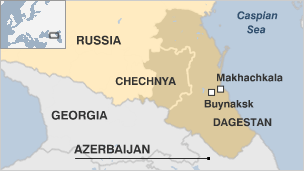UPDATE: Ramzan Kadyrov, Chechnya’s president, has come out with a statement disclaiming Chechen culpability, but in a way that blames American ‘attitudes and beliefs,’ and I doubt it will do much to lift American hearts and minds in favor of Chechnya:
Tragic events have taken place in Boston. A terrorist attack killed people. We have already expressed our condolences to the people of the city and to the American people. Today, the media reports, one Tsarnaev was killed as [police] tried to arrest him. It would be appropriate if he was detained and investigated, and the circumstances and the extent of his guilt determined. Apparently, the security services needed to calm down the society by any means necessary.
Any attempt to draw a connection between Chechnya and Tsarnaevs — if they are guilty — is futile. They were raised in the United States, and their attitudes and beliefs were formed there. It is necessary to seek the roots of this evil in America. The whole world must struggle against terrorism — that we know better than anyone else. We hope for the recovery of all the victims, and we mourn with the Americans.
It’s a small Caucasian republic in Russia with barely over one million people, but Chechnya attracted attention worldwide in the 1990s when it fought two wars against Russia to become a separate republic.
Now, with word that the two bombing suspects are/were Chechen (or perhaps from neighboring Dagestan, it’s unclear to me), Chechnya is likely to come to the forefront as a topic of U.S. foreign relations, even as one of the suspects has been killed overnight and a wide manhunt continues for the second suspect, 19-year-old Dzhokhar Tsarnaev.
We still have more questions than answers at this point, and there’s no evidence, as far as I can tell, that this is some concerted plot concocted in Grozny or Makhachkala, so I’m wary to make any sweeping statements.
But Tyler Cowen at Marginal Revolution worries that it will destroy the chances of the U.S. Congress passing a comprehensive immigration bill later this year, and while I think that’s a valid concern, I worry more that this will cause huge anti-Chechen sentiment in the United States, emboldening Russian president Vladimir Putin to effect a crackdown on the North Caucasus, which still features some amount of insurgent activity since Russian troops asserted control over Chechnya in 2000.
Predominantly Islamic, Chechnya largely held off the assertion of Russian political and military control following the First Chechen War from 1994 to 1996, and the Russian military’s failure was one of the reasons (aside from Russia’s economy) that former Russian president Boris Yeltsin became very unpopular in early 1996 months ahead of his reelection. Yeltsin, and Putin thereafter, from 1999 to 2000 in the Second Chechen War, definitively brought Chechnya under federal control. Ramzan Kadyrov, the current Chechen leader since 2007, is the son of a former-rebel-turned-Kremlin-ally, and his iron rule has restored some amount of political and economic stability to Grozny, though his tenure’s been marked by a number of accusations of human rights violations.
If anything, neighboring Dagestan has become the more recent problem as a seat of instability and violence, and the struggle in the two regions has transformed from a largely post-Soviet nationalist struggle into one that’s much more religious in nature over the past decade.
The former U.S. ambassador to the United Nations under the Bush administration, John Bolton, is already claiming they are hired killers in a grander conspiracy.
As Politico notes, U.S. presidents haven’t exactly been profiles in courage on the Chechen issue in the past:
For years before the Boston Marathon suspects were identified, American presidents have avoided talking about Chechnya — it’s been a prerequisite demanded by Russia’s leaders for maintaining strong relationships.
President Barack Obama and his administration have been quiet on the continued tensions between Vladmir Putin’s government and the area that is its federal subject. That follows the pattern of his predecessors: Bill Clinton pushed Boris Yeltsin to find a peaceful settlement to what began in 1994 as a war to gain independence from Russia, as did George W. Bush.
Since taking office, Obama hasn’t said the word “Chechnya” publicly. The Treasury and State Departments have, though, taken action.
Reports of Russian military abuses abound from its Chechen campaigns from the 1990s and 2000s, many documented by the late Russian journalist Anna Politkovskaya. Pro-Chechen groups have conducted a number of terrorist activities against citizens in Russia, many of them harrowing — the 2002 Moscow theater hostage crisis, the 2003 Stavropol train bombing, the 2004 Moscow metro bombing, the 2004 Beslan school siege — but never outside Russia.
I’m not going to pretend to be an expert on current Chechen rebel activity, but I fear that Putin could use the Boston bombing — if indeed the link to Chechnya is confirmed — as a pretense for another campaign against Chechen and Dagestani rebels.
Photo credit to BBC News.

Oh no! Islamic murderers are feeling oppressed.
Chechnya also attracted attention (but not yours, interestingly enough) worldwide during the Beslan school hostage crisis, in which Chechen rebels murdered 186 children.
I mentioned Beslan in the post earlier. The post isn’t about anyone who feels oppressed, it’s about the way in which Vladimir Putin might use the Boston bombing as a pretext for cracking down on Chechnya and Dagestan. Notably, this is already happening: http://rendezvous.blogs.nytimes.com/2013/04/20/after-boston-and-tsarnaevs-russians-urge-u-s-to-rethink-chechnya/?partner=rss&emc=rss&smid=tw-nytimesworld
And why are you so worried about the welfare of these terrorists?
Not everyone in Chechnya and Dagestan is a terrorist, obviously, and there’s documented evidence of Russian abuse of human rights in its conduct in that region, so that’s potentially very worrying. As is typically the case, there are abuses (like Beslan) from the most radical Chechen rebels and there are abuses from the Russian military, but my understanding is that the situation has improved since the mid-2000s.